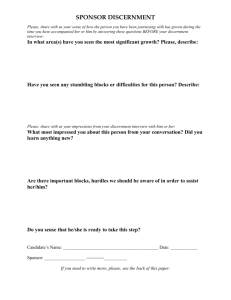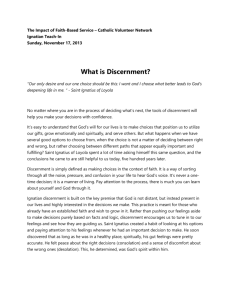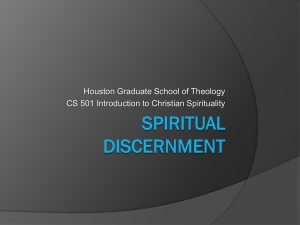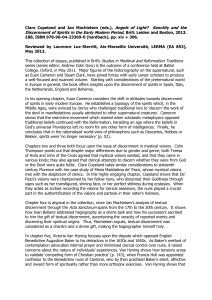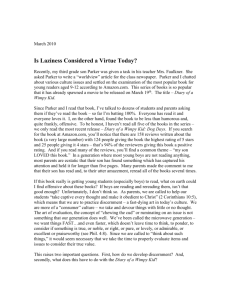File - Lifelong Faith
advertisement
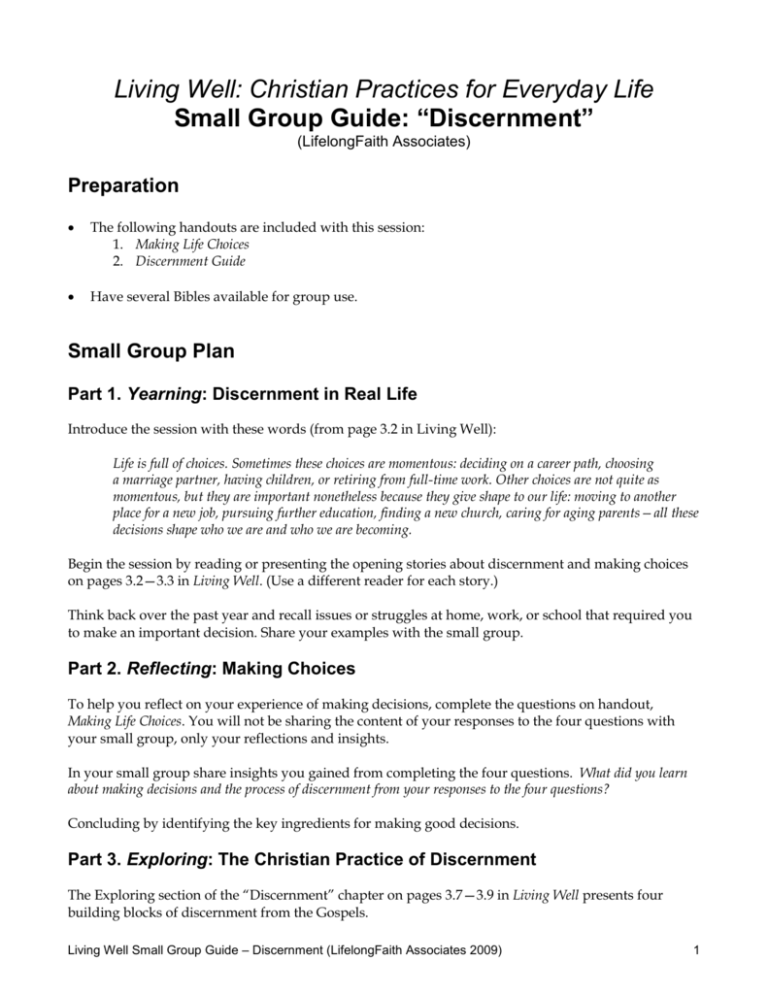
Living Well: Christian Practices for Everyday Life Small Group Guide: “Discernment” (LifelongFaith Associates) Preparation The following handouts are included with this session: 1. Making Life Choices 2. Discernment Guide Have several Bibles available for group use. Small Group Plan Part 1. Yearning: Discernment in Real Life Introduce the session with these words (from page 3.2 in Living Well): Life is full of choices. Sometimes these choices are momentous: deciding on a career path, choosing a marriage partner, having children, or retiring from full-time work. Other choices are not quite as momentous, but they are important nonetheless because they give shape to our life: moving to another place for a new job, pursuing further education, finding a new church, caring for aging parents—all these decisions shape who we are and who we are becoming. Begin the session by reading or presenting the opening stories about discernment and making choices on pages 3.2—3.3 in Living Well. (Use a different reader for each story.) Think back over the past year and recall issues or struggles at home, work, or school that required you to make an important decision. Share your examples with the small group. Part 2. Reflecting: Making Choices To help you reflect on your experience of making decisions, complete the questions on handout, Making Life Choices. You will not be sharing the content of your responses to the four questions with your small group, only your reflections and insights. In your small group share insights you gained from completing the four questions. What did you learn about making decisions and the process of discernment from your responses to the four questions? Concluding by identifying the key ingredients for making good decisions. Part 3. Exploring: The Christian Practice of Discernment The Exploring section of the “Discernment” chapter on pages 3.7—3.9 in Living Well presents four building blocks of discernment from the Gospels. Living Well Small Group Guide – Discernment (LifelongFaith Associates 2009) 1 1) 2) 3) 4) Believe in the Goodness of God Believe that Love is Our Primary Calling Believe that God Communicates with Us Believe in Life 1. The Christian Practice of Discernment Begin by reading the introduction to the Christian practice of discernment on page 3.6 in Living Well. Discuss as a group your understanding of discernment and what insights you gained from the brief introduction in Living Well. 2. Jesus and Discernment Read the “Temptation of Jesus” in Luke 4:1-13 using four actors and a narrator. Select a narrator to read the non-speaker parts of the Gospel story. Select a person to role play Jesus and three people for the Satan role—one for each temptation. After the Scripture reading read the following reflection from page 3.5 in Living Well. The story of Jesus’ temptation in the desert is an exercise in discernment. Jesus recognizes the temptations for what they are: invitations to satisfy what one hungers for, to be admired, even worshiped, by people, and to own all imaginable goods. The spirit of these temptations runs counter to the Spirit of God in the life of Jesus. This wilderness scene gives us a vivid image of the discrimination involved in discernment. We need to pay attention, to look deep into our lives and sort out the various motivations for our thoughts and actions. Of the many inner and outer voices that prompt us, which will we heed? Discuss the following question: What are the things that distract us (“tempt us”) from making good choices? 3. Building Blocks of Discernment Divide into four teams, have each team take one of the four building blocks, and prepare a short presentation for the whole group summarizing the Biblical teaching and commentary in Living Well on pages 3-6-3.9 in Living Well: 1. 2. 3. 4. Believe in the Goodness of God (Psalm 139:1-6) Believe that Love is Our Primary Calling (Mark 12:28-31) Believe that God Communicates with Us (John 14:16-17, 26) Believe in Life (Deuteronomy 30:15-16, 19) Have each team present their reflections. Conclude by sharing your responses to the following questions: What insights about making decisions and discernment did you gain from the four building blocks? How could you apply these building blocks to making decisions as an individual and/or household? Living Well Small Group Guide – Discernment (LifelongFaith Associates 2009) 2 Part 4. Living: Application of the Christian Practice of Discernment to Daily Life 1. Practicing Discernment To see how the discernment process works in action select one of the five opening stories on pages 3.23.3 in Living Well, and use the discernment process described on pages 3.10-3.13 in Living Well to write a “case study” of how you would apply the discernment process to this life choice. You can record your group’s responses to the questions/actions at each stage of the process using the Discernment Guide handout. Conclude by reflecting on the discernment “case study” and its application to a real life situation: What did you find helpful about the discernment process? What was difficult? What was unhelpful? How did the process connect to one’s faith and relationship with God? What did you learn about the process of discernment from this activity? How can you use this process in your own life? Additional Options for Practicing Discernment You can invite one or more people from your church to share a personal story of how they have practiced the discernment process using the Discernment Guide as a framework for their presentation. Be sure to have a variety of situations to connect with the participants. You can use a segment from a film in which an individual or family is faced with a decision. Use the film to “set-up” the situation and then use the Discernment Guide to develop a response to the questions/actions, illustrating how someone might use the process in this situation. 2. Applying the Discernment Process To apply the discernment process to your own life review the two decisions that you identified at the beginning of the session: the wise decision and the one they regret. Analyze the two decisions using the 10 “steps” in the Discernment Guide. Work through each step in the process noting things you did and did not do, and what you would do differently now using the process in the Discernment Guide. After a time for reflection, consider the following question and share your insights with the group: How can using the process of discernment be beneficial to me (and my family) and improve my decision-making? Conclude by reading “The Benefits of Discernment” on page 3.13 in Living Well. Part 5. Praying: Practicing Discernment Daily—Paying Attention to God Conclude the session by experiencing the Prayer of Examen found on page 3.15 in Living Well. Play reflective music in the background during the prayer. Have one member of the group lead everyone through the process. The Prayer of Examen helps us look for traces of God’s actions in our daily life, individually or as a household. It is usually done in the evening, looking back over the day, or it can be done as a household at the evening meal. This is a time of quiet to spend alone or with each other in the presence of God. Living Well Small Group Guide – Discernment (LifelongFaith Associates 2009) 3 1. First, note the gifts God has given you today. Give thanks for all God’s gifts and benefits. Pause for reflection. 2. Ask God that this reflection be a time of special grace and revelation. You can use these words: Be near us now Lord. Let us look together at the day. Pause for reflection. 3. Review the day with God. Look at the stirrings of your heart, your thoughts, your choices as the day progressed. Which have been of God? Which not? What does God want to say to you about both? Pause for reflection. 4. Give God thanks and ask for forgiveness for any failure or omission, and for healing from their effects. Use these or similar words: Gracious God, everything is a gift from you. I give you thanks and praise for the gifts of today, such as …. I ask your forgiveness and mercy for …. I ask your healing in …. Pause for reflection. 5. Look forward to the next day, and plan concretely with God how to live it according to God’s desire for your life. Ask for the graces you desire for tomorrow. Lord God, continue to be present with me in my life each day. Pause for reflection. (From: The Art of Discernment: Spiritual Practices for Decision-Making, by Elizabeth Liebert) Close the session with one of the prayers on page 3.16 in Living Well. Living Well Small Group Guide – Discernment (LifelongFaith Associates 2009) 4 Making Life Choices Complete this reflection as an individual or as a whole family. 1. Recall a decision that in retrospect was a wise one. How did you make it? What factors did you weigh? With whom did you consult? How did you manage opposing points of view? What would have been the consequences if you had made a different decision? Where was God in this decision? 2. Recall a decision you made that you now regret. What was the process by which you made that decision? Have you since discovered clues about how you could have decided differently? Where was God in this decision? 3. Make a short list of persons you might call when you are faced with a tough decision. What do you look for from these persons? How do they help you? 4. When you think about the major decisions you have made in your life, how have your religious or spiritual values influenced your decisions? Living Well Small Group Guide – Discernment (LifelongFaith Associates 2009) 5 Discernment Guide 1. Name the issue. 2. Pray for enlightenment. 3. Gather appropriate data. consult Scripture seek the advice of trusted advisors heed the collective sense and wisdom of the Christian community read widely and deeply the best ancient and contemporary thinking pray 4. Sort our thoughts and data. thoughts toward our self thoughts toward God thoughts toward evil Is the choice that seems to be emerging God’s way for us? 5. Virtually live the decision. 6. Look for a confirming sign. Can we live in the two weeks of virtually implementing the decision? Is there a confirming sign? Is there joy, peace, or consolation or is there discomfort, restlessness, or anxiety? 7. Make the decision. 8. Implement the decision. Can my decision be broken down into steps? If so, note an appropriate order. Does anyone need to be informed about this decision in advance of its implementation? If so, what is the best way to do that? Who besides me might be involved in carrying out the decision? How will I invite them to this role? If some of them choose not to join me, what will I do? Who will support me along the way? If reflecting and praying on these practicalities elicits some fear or resistance, weigh this against the experience of spiritual freedom that resulted from your decision. Ask for the grace to act from that place of spiritual freedom. 9. Ritualize the decision. 10. Guard your heart and watch your thoughts. Living Well Small Group Guide – Discernment (LifelongFaith Associates 2009) 6 Resources for Developing the Christian Practice of Discernment “Discernment.” Frank Rogers. Practicing Our Faith. Dorothy C. Bass, editor. San Francisco: Jossey-Bass, 1997. Discernment: A Path to Spiritual Awakening. Rose Mary Dougherty. New York: Paulist Press, 2009. [DVD also available] How does God fit into our decisions and life choices? How do we discern what fits with who we are? How do we live discerning lives? Discernment is the process of realizing, and then following, our spiritual paths. In this book, lifelong spiritual guide Rose Mary Dougherty explains the essentials of cultivating a discerning heart. Drawing on the teachings of Christianity, other spiritual traditions, and her own life experiences, the author guides readers across the sometimes difficult terrain of spiritual discernment and invites them to explore their own experiences. She reminds them that opportunities for discernment are embedded into all of life and that ultimately discernment is a way of life in and of itself. Living into the Answers: A Workbook for Personal Spiritual Discernment. Valerie K. Isenhower and Judith A. Todd. Nashville: Upper Room Books, 2008. Living into the Answers teaches a way to ask for and receive God’s guidance as you approach an issue or choice. “Large or small, the decisions of life point toward particular paths,” write Isenhower and Todd. “Paying attention to the process of discerning God’s desire for our life starts us on a journey that leads to abundant life. …It opens us to a larger number of life choices and to a more interactive relationship with God who calls us for future possibilities.” Discernment isn’t magic. It isn’t passive. Discernment isn’t a complicated mystical practice. Rather, it’s a process of listening and choosing based on the understanding that God is to be at the center of decision making. The authors explain how to live in a way that satisfies the yearning for a deeper connection with the spiritual. There may not always be one “right” answer because there’s no shortcut to knowing which job to take, house to buy or relationship to pursue. But we don’t have to make these decisions alone. As people of faith, we know every aspect of our lives is important to God, who created us for a purpose. Living into the Answers is an inspiring and practical personal workbook that introduces tools and practices that invite God in as we consider priorities and alternatives, guides us to create prayerfully considered options, and helps us live with the confidence that God will use our choices to invite us into a deeper and more fruitful relationship. Sacred Compass: The Way of Spiritual Discernment. J. Brent Bill. Brewster, MA: Paraclete Press, 2008. How do you discover God’s will for your life—every day? Sacred Compass offers a fresh and deeper way of living a God-directed life. J. Brent Bill draws on the quiet beauty of the Quaker path to show how spiritual discernment is more about sensing God’s gracious presence than it is about making the right decisions. As you use this book to chart your own spiritual course, you will find yourself led to unexpected places, comforted by the knowledge that God uses all of our experiences to bring us close. Tools Matter for Practicing the Spiritual Life. Mary Margaret Funk. New York: Continuum, 2001. (See chapter 7. Tools of Discernment) Living Well Small Group Guide – Discernment (LifelongFaith Associates 2009) 7 Tools Matter presents more than two dozen “tools” or practices of the spiritual life. Many of these (such as fasting, vigils, ceaseless prayer, and manual labor) derive from desert mothers and fathers of the fourth and fifth centuries, but just as many come from later times: the practices of the Jesus Prayer, of emptiness, of recollection, of self-abandonment, of the presence of God, and of colloquy. The book concludes with a chapter on discernment, spiritual direction, and the limitations of each tool. The Way of Discernment: Spiritual Practices for Decision Making. Elizabeth Liebert. Louisville: Westminster/John Knox Press, 2008. How can Christians invite God into their decision making? Liebert says that discernment is about aligning human will with God’s. Unlike ordinary decision making, it requires prayer and the accountability of a faith community to help us know which way to go. Drawing on Christian thinkers through the ages, from Ignatius of Loyola and Jonathan Edwards to Frederick Buechner and Thomas Merton, Liebert teaches that discernment is both a spiritual gift and an acquired habit that can be honed through regular practice. To that end, she provides extensive exercises to help readers identify and work through discernment issues in their own lives. Readers should plan to take time with this book, because the exercises yield their richest rewards through careful and slow implementation—ideally over a period of 11 weeks. While the author cautions that absolute certainty is rarely possible, a diligent practice of discernment can lead to confirmation. Liebert’s wise spiritual counsel will aid many seekers as they determine their next step. The Way of Discernment: A Small-Group Experience in Spiritual Formation (Companions in Christ) (Participant’s Book). Stephen Doughty, Marjorie J. Thompson. Nashville: Upper Room Books, 2008. The Way of Discernment: A Small-Group Experience in Spiritual Formation (Companions in Christ) (Leader’s Guide). Marjorie J. Thompson. Nashville: Upper Room Books, 2008. We stand before the forest of our own wonderings. Then bit by bit, we become aware of a path through the forest. “What do I do now?” From deep within us there’s a desire to do the right thing, to make wise choices, to live in a fruitful manner. There are simple steps anyone can take that will open understanding. The scriptures repeatedly acknowledge the existence of a sure pathway in life. “Even the most exacting circumstances lies a way that leads to greater understanding of God’s desire and, therefore, of what we are to do,” write the authors. “…We pray for deeper understanding. We wait. We struggle. We search. Then, aha! Understanding comes. Perhaps it flares forth suddenly. Perhaps it emerges with the slow, growing radiance of the morning sun. Either way, we know we have not brought the insight into being ourselves. It comes from beyond us.” So, how do you discover God’s guidance for personal and congregational decisions? Discover the way to greater clarity in The Way of Discernment, a 10week study for small groups. More of a journey in discernment than a how-to guide, this study gently leads to a prayerful path for a richer, wiser life. The Way of Discernment offers a biblical, theological and practical framework for understanding the practice of discernment. It provides principles of personal and group discernment, daily exercises to help you move from information to experience, weekly meeting plans (in Leader’s Guide) designed for group sharing and worship, and penetrating questions to aid the process of discernment. Living Well Small Group Guide – Discernment (LifelongFaith Associates 2009) 8
